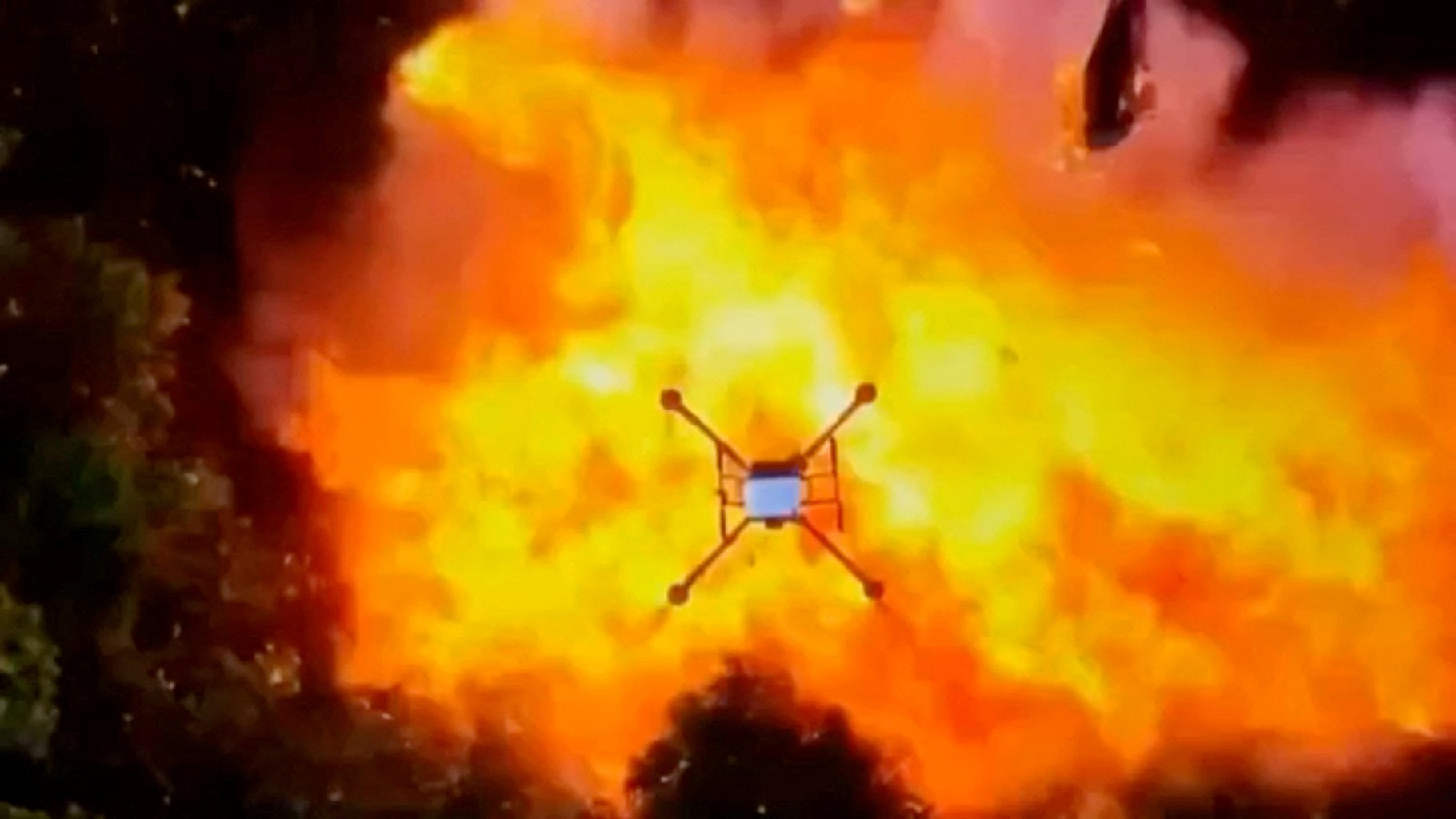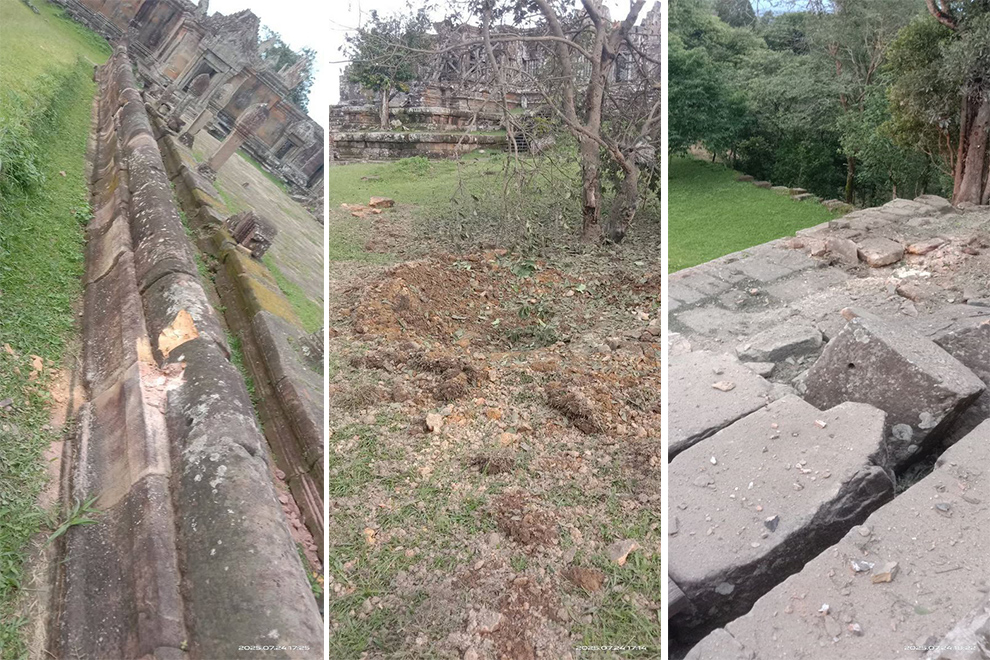27 July 2025: Thailand started fire into Cambodia since 2:30am. Thailand does not respect the mediation effort from President Donald Trump.
This article examines the events leading to the incident, the historical context of Thai-Cambodian relations, the details of Trump’s mediation efforts, and the broader implications of Thailand’s decision to act militarily.
Thailand and Cambodia share a complex and often volatile border that stretches over 800 kilometers. Their relationship has been marked by disputes over territorial sovereignty, cultural heritage sites, and natural resources.
One of the most contentious areas has been the Preah Vihear Temple, a UNESCO World Heritage site claimed by both nations. Although the International Court of Justice (ICJ) ruled in favor of Cambodia in 1962, granting it sovereignty over the temple, disputes over the surrounding land continued well into the 21st century. Occasional border clashes between troops have occurred since the early 2000s, especially around the temple complex and other strategically significant locations.
In recent years, both countries had made strides toward peace through bilateral agreements and economic cooperation. However, simmering mistrust, ultra-nationalistic rhetoric, and internal political pressures have repeatedly threatened to derail these fragile gains.
The Situation Leading Up to July 27
Escalating Tensions
Throughout the first half of 2025, several incidents suggested that tensions were once again on the rise:
-
Military exercises along the border by both Thai and Cambodian forces increased in frequency and scale.
-
Accusations of cross-border incursions and unauthorized road constructions created further unease.
-
Nationalist media narratives in both countries inflamed public sentiment, demanding stronger government responses to perceived provocations.
These developments signaled a deteriorating situation, despite diplomatic channels remaining open.
Trump’s Involvement
In a surprising move, Donald Trump, the former U.S. President who has remained a polarizing yet influential figure on the global stage, initiated a private mediation effort in June 2025. Backed by a coalition of business leaders and former diplomats, Trump aimed to broker a deal that would see both countries reduce troop presence near contested areas and engage in joint development of disputed territories.
Trump’s efforts, though unconventional, were taken seriously by some in the international community, particularly due to his ties with influential business networks and his promise of significant U.S. investment in the region.
Cambodia’s government welcomed the initiative, hoping to avoid conflict and gain international backing. Thailand, however, appeared lukewarm and eventually dismissive of the former president’s role. Thai officials insisted that border issues were strictly bilateral matters and questioned Trump’s impartiality, citing his perceived alignment with Cambodian Prime Minister Hun Manet.
The Attack: July 27, 2025
Initial Reports
At approximately 2:30 AM local time, multiple Cambodian outposts near the town of O'Smach, in Oddar Meanchey Province, reported incoming fire. According to Cambodian military spokespeople, the attack lasted over an hour and involved heavy artillery and drone surveillance.
Civilian areas in nearby villages sustained damage, although no fatalities were immediately reported. Several homes were destroyed, and emergency services were mobilized to evacuate residents.
Cambodia’s Response
Cambodia’s Prime Minister, Hun Manet, condemned the attack as an “unprovoked act of aggression” and vowed to defend national sovereignty. The Cambodian armed forces were placed on high alert, and reinforcements were deployed to several border posts.
Hun Manet, in a nationally televised address later that morning, also criticized Thailand’s disregard for diplomatic engagement, stating:
“At a time when we were committed to peaceful dialogue and hopeful for mediation under international goodwill, Thailand chose the path of violence. This is a betrayal of our shared regional aspirations.”
Thailand’s Position
The Thai government has not officially confirmed or denied the attack. However, anonymous military sources told local media that the action was in response to “provocations” and alleged Cambodian troop build-ups near sensitive zones.
Thailand’s Prime Minister, General Surasak Anuwat, held a press conference the same day but stopped short of acknowledging the incident directly. He emphasized Thailand’s right to self-defense and reaffirmed the country’s commitment to peace — while simultaneously warning that any threats to Thai sovereignty would be met with “firm measures.”
Observers noted that General Surasak's tone was defiant, likely driven by domestic political pressure from hardline nationalist factions within the Thai military and parliament.
Reaction to Trump’s Mediation Efforts
The timing of the attack—just days before a scheduled summit in Bangkok, where Trump was to present a draft peace framework—sent a clear message that Thailand was not willing to entertain outside mediation.
Donald Trump, speaking from his residence in Florida, issued a brief statement:
“Peace was within reach. It’s a shame Thailand rejected diplomacy. I hope cooler heads prevail before things spiral out of control.”
Trump’s team also claimed that they had secured preliminary agreement from Cambodia and were preparing for trilateral discussions, which now appear to be indefinitely postponed.
International Reaction
ASEAN
The Association of Southeast Asian Nations (ASEAN) expressed concern over the incident and urged both sides to exercise restraint. In a statement released from Jakarta, the ASEAN Secretariat called for:
ASEAN’s ability to enforce peace remains limited due to its non-interference principle, but there are growing calls from member states like Indonesia and the Philippines for more assertive intervention mechanisms.
United Nations
The UN Secretary-General António Guterres condemned the violence and urged both sides to resume peaceful negotiations. A motion was submitted to the UN Security Council requesting a fact-finding mission to the Thai-Cambodian border, but its passage remains uncertain due to geopolitical divisions.
Neighboring Countries
Vietnam, Laos, and Malaysia issued statements of concern, with Vietnam emphasizing the importance of regional stability and Laos offering to mediate.
China, which has deep economic ties with both Thailand and Cambodia, has remained neutral, merely calling for dialogue without assigning blame.
Impact on Civilians
As always, it is civilians who suffer the most during cross-border conflict. In the days following the attack:
-
Hundreds of families fled their homes along the Cambodian border.
-
Temporary shelters were set up by humanitarian organizations.
-
Reports of psychological trauma, food shortages, and lack of access to healthcare services began to emerge.
Cambodia appealed to international agencies for emergency assistance, particularly for displaced populations. Thailand restricted access to the affected zones, citing military security, which has made independent verification of damage difficult.
The Regional and Global Implications
Destabilization of Southeast Asia
This conflict comes at a fragile time for Southeast Asia, where maritime disputes in the South China Sea, climate-related challenges, and rising authoritarianism already strain diplomatic relations.
A prolonged Thai-Cambodian conflict could:
Geopolitical Rivalries
Analysts have raised questions about whether larger powers might exploit the situation. With Trump attempting a diplomatic comeback and the U.S. reasserting influence in the Indo-Pacific, some speculate whether Thailand’s snub was influenced by a strategic pivot toward other allies, possibly China or Russia.
Looking Ahead
Despite the violence, hope for peace remains. Track II diplomacy—efforts by academics, former officials, and civil society leaders—are ongoing. Some Cambodian and Thai scholars have jointly issued a call for “de-escalation through cultural diplomacy,” proposing student exchanges, historical truth commissions, and economic collaboration in non-contested areas.
However, for any meaningful progress to occur, both governments must:
-
Commit to ceasefire and transparent communication
-
Allow international observers into conflict zones
-
Reengage in structured, multi-party negotiations
Conclusion
The events of July 27, 2025, mark a significant setback in Thai-Cambodian relations and pose a serious challenge to regional peace. Thailand’s decision to fire into Cambodia—whether as a calculated move or reactive aggression—not only disregarded the diplomatic overtures led by Donald Trump but also escalated an already fragile situation.
As both nations weigh their next steps, the eyes of the world are watching. Will diplomacy find a way to pull the region back from the brink? Or will historical grievances, nationalist agendas, and strategic miscalculations plunge Southeast Asia into prolonged instability?
The next few weeks will be critical.










